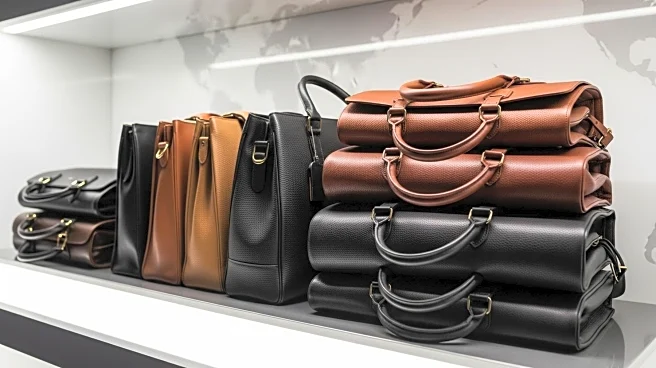What is the story about?
What's Happening?
The Italian leather industry, comprising approximately 10,000 businesses, reported a turnover of 30 billion euros for 2024, marking an 8.6 percent decrease from the previous year. The decline continued into the first half of 2025, with a further 5.3 percent drop compared to the same period in 2024. Confindustria Moda Accessories, representing key sectors like footwear and leather goods, highlighted challenges such as global demand slowdown and weak Asian markets. A significant concern is the 15 percent tariff imposed by the U.S. on imports from the European Union, which threatens to impact Italian exports and company margins. Despite these challenges, exports to the U.S. showed resilience, growing by 1.4 percent year-on-year from January to May 2025.
Why It's Important?
The decline in the Italian leather industry is significant due to its impact on international trade and economic relations, particularly with the U.S. The tariffs imposed by the Trump administration could lead to reduced competitiveness for Italian leather products in the U.S. market, affecting company profits and employment within the sector. The industry’s performance is crucial for Italy’s economy, given its role in the 'Made in Italy' brand, which is a key driver of exports. The situation underscores the broader geopolitical tensions affecting trade between the U.S. and the European Union, with potential repercussions for other industries reliant on international markets.
What's Next?
The Italian leather industry is focusing on internationalization efforts to mitigate the impact of tariffs and declining demand. Initiatives like trade fairs and collaborations with the Ministry of Foreign Affairs aim to bolster exports and maintain market presence. The industry is also prioritizing training to equip young professionals with skills necessary for sustaining the 'Made in Italy' legacy. The real impact of U.S. tariffs will become clearer in the latter half of 2025, as data on margins and competitiveness are analyzed post-August.
Beyond the Headlines
The situation highlights the ethical and economic challenges faced by traditional industries in adapting to geopolitical shifts. The emphasis on training and international collaboration reflects a strategic approach to preserving cultural heritage while navigating modern economic landscapes. The industry's resilience amid adversity may serve as a model for other sectors facing similar global pressures.















